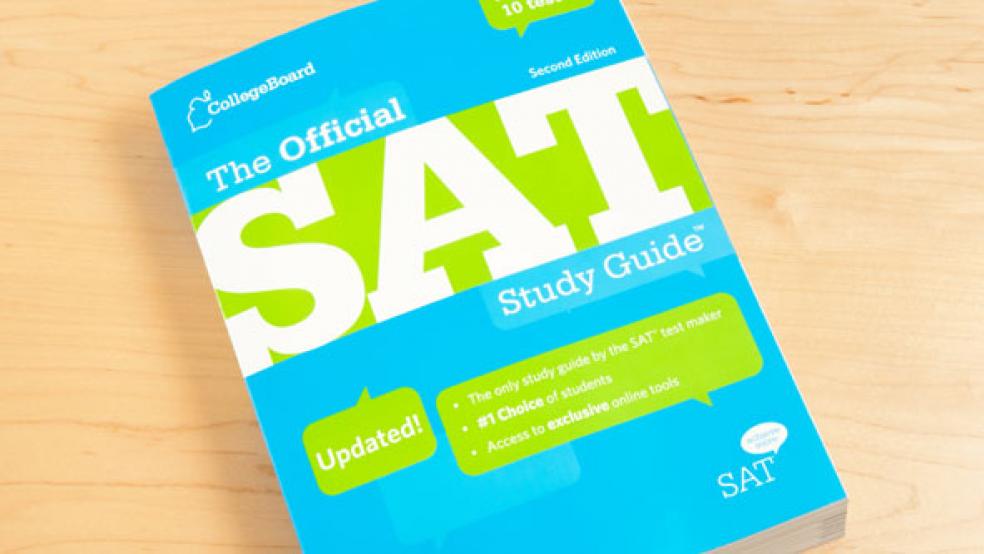Jennifer Iadanza has already begun considering how recent changes to the SAT exam may affect her daughter Emma, an 8th grader at Roslyn Middle School in New York State who will be in one of the first high school classes to be affected by those changes.
Since she hasn’t completely figured it out yet, she’s still spending on test prep or tutoring, estimating that she and her husband are willing to cough up between $2,000 and $4,000. She says she would use free material as a supplement—but not a substitute for paid prep.
Related: The New SATs and the Great Delusion of Excellence
Experts says that free material and other changes to the exams like making the essay optional, a return to scoring on the old 1,600 point scale, eliminating penalties for wrong guesses and getting rid of obscure vocabulary words, will hardly put the prep industry on life support. Many believe that at least in the short run it will do the opposite: Uncertainty about the exams will drive more business to prep companies and private tutors as anxiety mounts among parents and students.
“Test changes historically drive business,” says Seppy Basili, vice president, of Kaplan Test Prep. “When the SAT last saw major revisions about 10 years ago, we saw our biggest sales increase in a long time. Typically, test changes breed uncertainty, which gives students and parents an extra reason to seek help and reassurance from experts to gain a competitive edge.”
Powerhouses like Kaplan Test Prep and Princeton Review have for decades led the $4.5 billion college test industry in preparing students for the high-pressured exams, but high-end prep has long been criticized for unfairly favoring the affluent who can afford to pay sometimes-exorbitant prices. SAT classes can cost about $1,100 or more, while private tutoring can range between $125 and upwards of $500 per hour.
Related: SAT Reading Scores Hit 40-Year Low
Robert Schaeffer, the public education director for the watchdog organization FairTest and a persistent critic of the SAT, agrees that the free material will not hurt the industry.
“People realize that personalized professional training is superior to mass market material,” he says. “Prep is like a high priced steroid that temporarily boosts performance.”
It’s not a surprise that one of the most anticipated SAT changes is the College Board’s—The College Board, is a private non-profit that administers the SAT—partnership with Khan Academy to provide high quality free test preparation for all students. College Board President David Coleman wants to make the test more egalitarian and provide equal access to prep material.
Khan, an educational nonprofit website founded in 2006, already provides free online material, as do many other companies, but this partnership will make thousands of videos and practice problems exclusively available to the public in the spring of 2015, a year before the new exam.
Related: How to Beat the High Cost of College Extras
The SAT changes are designed to focus more on academic skills and evidence-based thinking than testing prowess, but critics point out that many of the revisions make the test strikingly similar to the ACT, which in recent years has become a formidable SAT competitor. For the first time in 2012, the ACT had more test-takers.
Since 2005, 97 colleges have decided to make both the SAT and ACT optional to incoming students according to a FairTest survey. About 80 percent of four-year colleges still require SAT or ACT scores.
Shawn Abbott, the Assistant Vice President and Dean of Admissions at New York University, says it’s too early to comment on what impact the new test will have on NYU admissions.
“The changes aren't likely to mean much to NYU,” he says. “The SAT will simply remain one test students can submit to be eligible for admission and we will use whatever scores we receive (regardless of what the scale is for that particular test) as data to help - but not dictate - our admission decisions.”
Related: The Good, the Bad and the Ugly of MOOCs
How much test prep actually helps is debatable. A report released in 2009 by The National Association for College Admission Counseling criticized the prep industry for hyping their results and found on average that SAT coaching resulted in only about a 30-point improvement in scores.
But even with many competitive schools like Brandeis and Bowdoin deemphasizing the exam and the increasing criticism about SAT effectiveness, the prep industry continues to thrive.
Sasha DeWind, the vice president of the New York based Tutor Associates, a high end private tutoring firm, says that the recent changes will at least in the short-run improve her company’s bottom-line.
DeWind says she and her organization are already fans of Khan Academy and recommend the organization’s algebra tutorials to clients. While she doesn’t see Khan as a competitive threat to those who can afford high-end tutoring, she does think it’s possible that they could poach middle-income students from rivals like Kaplan and Princeton Review.
Related: 6 Ways to Boost Financial Aid for College
Jerome Lucido, the executive director of the University of Southern California Center for Enrollment Research, Policy and Practice calls Khan Academy a “formidable free competitor” who will have “access to the real deal” because of their partnership with the College Board. Lucido also wants to see that SAT changes compel prep companies to focus more on academic skills than how to “beat the test” strategies.
Michael Zimmerman, the vice president for academic affairs and provost at The Evergreen State College, in Olympia, Wash., hopes that changes to the SAT will be a “step forward” in “assessing more broad scale intellectual achievements”
He would like to see Princeton, Kaplan --and Khan Academy no longer teach students that there’s “a body of material to memorize” or “tricks you can learn to do well” in order to attain a good SAT score.
“It certainly levels the playing field and it makes it more likely that everybody can achieve some level of coaching,” says Zimmerman says. “But people who have the money are going to ask--- can I get something for free or can I pay a lot of money for it. If I pay a lot of money for it, it must be more valuable.”
Top Reads from The Fiscal Time:
- 5 Surprising Things Americans Think About Taxes
- How the Wimpy Class of 2014 Can Get and Keep Jobs
- 5 Easy Ways to Ruin a Perfect Credit Score




